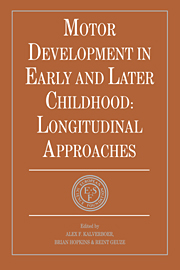Book contents
- Frontmatter
- Contents
- List of contributors
- Foreword
- Preface
- SETTING THE SCENE
- 1 Motor development in children at risk: two decades of research in experimental clinical psychology
- 2 Longitudinal studies in motor development: developmental neurological considerations
- SECTION I BIOLOGICAL BASIS OF MOTOR DEVELOPMENT
- SECTION II DEVELOPMENT OF BODY POSTURE AND GOAL-DIRECTED REACHING
- SECTION III MOTOR DEVELOPMENT, EARLY COMMUNICATION AND COGNITION
- SECTION IV ACQUISITION OF SKILLS
- SECTION V MOTOR DEVELOPMENT AND HANDICAP
- SECTION VI METHODOLOGICAL AND CONCEPTUAL CONSIDERATIONS
- Epilogue: description versus explanation
- Index
2 - Longitudinal studies in motor development: developmental neurological considerations
from SETTING THE SCENE
Published online by Cambridge University Press: 05 May 2010
- Frontmatter
- Contents
- List of contributors
- Foreword
- Preface
- SETTING THE SCENE
- 1 Motor development in children at risk: two decades of research in experimental clinical psychology
- 2 Longitudinal studies in motor development: developmental neurological considerations
- SECTION I BIOLOGICAL BASIS OF MOTOR DEVELOPMENT
- SECTION II DEVELOPMENT OF BODY POSTURE AND GOAL-DIRECTED REACHING
- SECTION III MOTOR DEVELOPMENT, EARLY COMMUNICATION AND COGNITION
- SECTION IV ACQUISITION OF SKILLS
- SECTION V MOTOR DEVELOPMENT AND HANDICAP
- SECTION VI METHODOLOGICAL AND CONCEPTUAL CONSIDERATIONS
- Epilogue: description versus explanation
- Index
Summary
INTRODUCTION
This chapter describes two categories of longitudinal studies on motor development. One category contains studies whose purpose it is to chart and to understand the changes with age of particular normal or abnormal sensorimotor functions. These are called individual-oriented. The other category consists of follow-up studies of groups of children who meet particular selection criteria with the aim of finding long-term relationships between group characteristics. These are called group-oriented studies. I give examples of studies, belonging to both categories, which have been carried out in the Department of Developmental Neurology, Groningen University Hospital. But first, here are a few remarks on the aim and value of these types of study.
Individual-oriented studies deal with changes with age which are thought to be characteristic of certain sensorimotor functions, with a view to explaining the dynamics of development. Somewhat paradoxically, more emphasis is given to the function studied than to the individuals who display that function. Because intraindividual comparisons of particular sensorimotor performances are made over time, and because an attempt is made to attribute changes in performance to developmental properties of the brain, other variables which may affect the developmental process have also to be taken into consideration. The effect of some of these variables on development is already known or can be guessed, for example in the case of diseases of the brain or of the motor apparatus itself, severe malnutrition or deformities. The effects of such variables can be discarded by excluding the subjects who suffer from them. For other variables the effect is either not known or is speculative, and, more importantly, many of these variables cannot be discarded because they are omnipresent.
- Type
- Chapter
- Information
- Motor Development in Early and Later ChildhoodLongitudinal Approaches, pp. 15 - 34Publisher: Cambridge University PressPrint publication year: 1993
- 8
- Cited by



